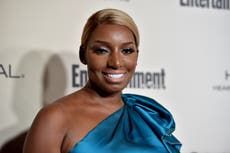Lizzo responds to backlash of ableist lyric in her song ‘Grrrls’: ‘I did not know it was a slur’
Singer changed the lyric after criticism from fans earlier this year
Lizzo has addressed her use of a slur in one of her songs, explaining that she’d never previously heard it used in an offensive context.
The singer, who released her latest album Special in July, was criticised after her song “Grrrls” included a word that has been used to mock disabled people.
Originally, the line went: “Hold my bag, b****, hold my bag / Do you see this s***? I’m a sp**.”
After receiving feedback from offended and disappointed fans, the “Good as Hell” star changed the line in the song to “Do you see this s***? / Hold me back”.
In addition, Lizzo (real name Melissa Jefferson) shared a statement at the time, telling fans that she never wanted to promote derogatory language.
The singer has expanded further on the controversy in a new interview, revealing that before it was brought to her attention in this way, she’d been unaware of the word’s harmful origin.
“I’d never heard it used as a slur against disabled people, never ever,” she told Vanity Fair,
“The music I make is in the business of feeling good and being authentic to me. Using a slur is unauthentic [sic] to me, but I did not know it was a slur.”
Lizzo went on to note that she’d only heard it in the context of rap songs and among Black friends, where it has been used for more celebratory purposes.

She continued: “It’s a word I’ve heard a lot, especially in rap songs, and with my Black friends and in my Black circles: It means to go off, turn up. I used [it as a] verb, not as a noun or adjective. I used it in the way that it’s used in the Black community.”
The musician then noted that her choice to change the lyric was down to more than internet chatter, but out of the desire to treat language consciously and to acknowledge how meanings can change.
Enjoy unlimited access to 100 million ad-free songs and podcasts with Amazon Music
Sign up now for a 30-day free trial. Terms apply.
ADVERTISEMENT. If you sign up to this service we will earn commission. This revenue helps to fund journalism across The Independent.
Enjoy unlimited access to 100 million ad-free songs and podcasts with Amazon Music
Sign up now for a 30-day free trial. Terms apply.
ADVERTISEMENT. If you sign up to this service we will earn commission. This revenue helps to fund journalism across The Independent.
“Language changes generationally; Nina Simone said you cannot be an artist and not reflect the times,” she explained.
“So am I not being an artist and reflecting the times and learning, listening to people, and making a conscious change in the way we treat language, and help people in the way we treat people in the future?”
Similarly, Beyoncé changed the same slur usage in her song “Heated”, six weeks after Lizzo.
Join our commenting forum
Join thought-provoking conversations, follow other Independent readers and see their replies
Comments


Bookmark popover
Removed from bookmarks